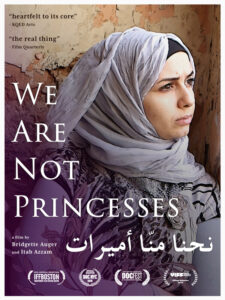
The Syrian refugee crisis is not the fallout of the inevitable violence of war, but an intended outcome of a deliberate strategy by the Assad regime to shift responsibility for his citizens to the rest of the world. Those who have fled the violence are not opportunists seeking handouts and social services in the West, but part of a massive humanitarian crisis that is the tool of a political agenda.
In “We Are Not Princesses”, Antigone, the ancient Greek heroine, ignites the spirits of 4 Syrian women living as refugees in Beirut.
In this world-wide, critically acclaimed feature documentary, Feminine wisdom, passed through the ages, connects the inner lives of a group of women providing them with a sense of belonging. Through intimate verite footage, the film illustrates that which is invisible to the eye: The thoughts, memories and dreams of these mothers, sisters and wives as they grapple daily with past traumas and future uncertainty.
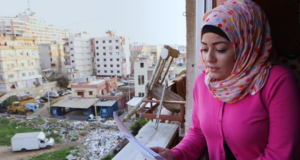
The women featured in “We Are Not Princesses” are living as refugees in Beirut. Four women are highlighted in the film, but others wanted to tell their stories. Their families would not allow them. Creative production animation was used to permit the denied to participate without revealing their identities.
The four featured women are:
Fedwa, 60, is the mother-figure of the group. Despite having lost two sons in two years, she remains determined to hold her family together. Paradoxically, she identifies with Sophocles’ flawed leader, Creon, because of his obstinacy and desire to keep order at all costs.

Heba, 27, Fedwa’s daughter, has, like Antigone, gone through the pain of losing both of her brothers, one of whom she never had the chance to bury as he was shot by a sniper coming out of a Damascus mosque.
Isra’a, 22, believes she is Antigone through and through. She is vocal about how the war has offered an opportunity to liberate Syrian women. She sings a rap of her story of fleeing Yarmouk camp, along with thousands of others, while wearing 4-inch high heels. Isra’a is self-confident and the other women admire her for it.
Mona, 30, when her son was dying was unable to get him to the hospital in time because of shelling. Now in Beirut, Mona is racked with guilt. Mona is the narrator leading the viewer through the film with her poetic reflections on life in the camps and on Antigone. Her reflections speak to the universal truths of the film, such as choice and how to regain a sense of self when all that you’ve known has been ripped away.
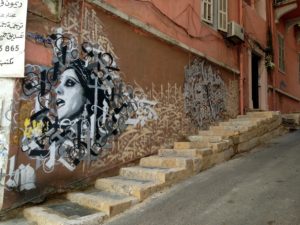
The film brings forth a unique structure. Built around the development of a theater workshop and the rehearsals for the performance, the structural foundation of the film, “We Are Not Princesses” is not an observational documentary about the putting on of a play. Instead, the film explores how these newfound tools of expression taught in the workshop play out in the lives of the women outside of the rehearsal and performance space.
The personal experiences and stories of the actresses, as well as their reaction to the play itself, are woven into the structure of the overall experience. Following the four women, we explore the theater space, the domestic space, and the public space of Beirut through an intimate narrative guided by the women’s voices.
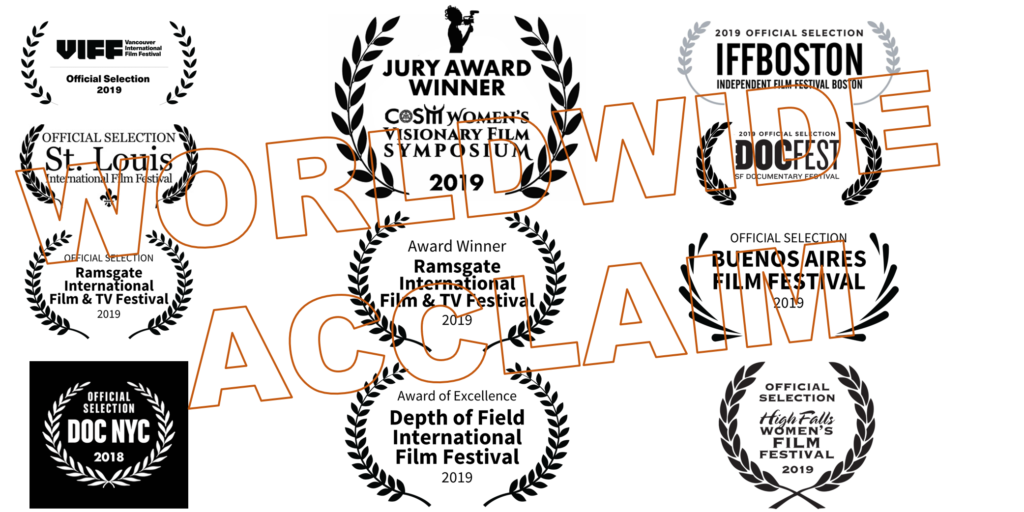
ABOUT THE FILMMAKERS
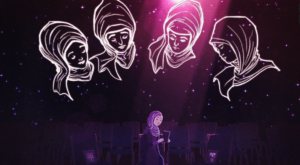
Bridgette Auger (Co-Director/DP/Producer): Bridgette is an artist and filmmaker strongly committed to using art for social change. She has lived and worked in the Middle East for over 12 years, covering the Arab Spring in Egypt and Libya as well as the refugee crisis as a result of the war in Syria. Bridgette sought out intimate stories to raise complex questions about sensitive issues. Her credits include The Guardian, New York Times, Die Zeit and the short film “This Is Not Me هاد مو أنا: Enduring Syria’s War”. Bridgette holds a degree in Photography and Imaging from NYU’s Tisch School of the Arts, and a Masters degree in Social documentation from the University of California, Santa Cruz.
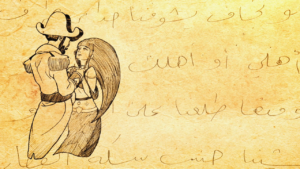
Itab Azzam (Co-Director/DP): Itab is a London-based Syrian filmmaker. She won a BAFTA in 2017 for her work producing the BBC Two series Exodus: Our Journey to Europe, and is also a winner of a British Broadcast award and a Liberty Human Rights award. Itab has extensive television experience including the BBC’s Syrian School; the series East West; and Bizarre Foods: Syria for the Travel Channel. She co-founded Sabbara, a Syrian social enterprise empowering women through economic employment and psychological support, and also co-founded the Open Art Foundation, an arts charity that works with marginalised communities around the world.
2018 / 74 Minutes / Color / 16×9 / Arabic with English Sub-titles / A film by Bridgette Auger and Itab Azzam
HOW TO ORDER:
Public Performance and Digital Site Licenses are available through Soundview Media Partners. To inquire or to place an order, write to info@soundviewmediapartners.com or simply choose from the options below:
For group screening prices, please inquire.
In-home/personal use copies are available on Amazon: https://amzn.to/3i0tbPD
WATCH THE TRAILER
WANP_Trailer from sara maamouri on Vimeo.
